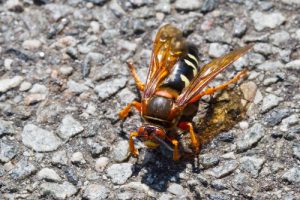Cicada Killer Wasps Are All Bluff!
By Chris Williams on July 19, 2011.
Q. We have this area on the side of our house where there are a bunch of very large yellowjackets nesting. I know yellowjackets usually nest in the ground and there must be a dozen holes there with wasps flying in and out, but I’ve never seen yellowjackets this big!
A. I don’t think you’re dealing with yellowjackets at all. Sounds like you’ve made the acquaintance of the cicada killer wasp. We’re into the dog days of summer when the annual cicadas make their appearance, singing in the treetops (see recent blog on cicadas). And shortly after the cicadas appear, cicada killer wasps appear as well. Their life cycle is tied to the cicada’s life cycle since the wasp larvae are fed on cicadas.
Cicada killers are large brown, black, and yellow wasps that nest in the ground. A cicada killer is the largest wasp you’re likely to see, almost 2 inches long. It has to be big to capture and fly off with a cicada! Although this wasp looks intimidating, it is extremely docile. The female has a stinger but it’s rare for a person to be stung. You would practically have to grab the wasp or step on one with bare feet for that to happen.
 As you already know, the female wasp digs conspicuous burrows in lawns and gardens, leaving a large pile of excavated soil next to the hole. Cicada killer wasps prefer relatively bare areas of ground and sandy soil. Several wasp females may nest in the same area but they do not have colonies like yellowjackets; they are considered solitary wasps. If you observe closely, you should see just one wasp going into each hole, rather than a bunch of wasps entering the same opening. The female stings and paralyzes a cicada, carries it back to her ground burrow where she lays an egg on it and then seals the hole. There is only one cicada and one egg per burrow and a single female can dig and provision many burrows. When the egg hatches, the larva feeds on the huge meal mom left.
As you already know, the female wasp digs conspicuous burrows in lawns and gardens, leaving a large pile of excavated soil next to the hole. Cicada killer wasps prefer relatively bare areas of ground and sandy soil. Several wasp females may nest in the same area but they do not have colonies like yellowjackets; they are considered solitary wasps. If you observe closely, you should see just one wasp going into each hole, rather than a bunch of wasps entering the same opening. The female stings and paralyzes a cicada, carries it back to her ground burrow where she lays an egg on it and then seals the hole. There is only one cicada and one egg per burrow and a single female can dig and provision many burrows. When the egg hatches, the larva feeds on the huge meal mom left.
It’s the male cicada killer’s job to guard the burrow area and he can be very noisy and aggressive—but he cannot sting. For all of their size and bluster, cicada killers are relatively harmless, but if they are nesting in an area where you or your children will be coming into regular contact with them, control may be required. In future, eliminating bare soil areas will make your lawn less desirable as a nest area for the cicada killer wasp.